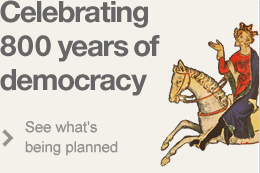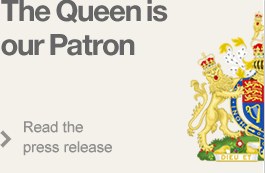By Dr. Sophie Ambler, University of East Anglia.
Stephen Langton (archbishop of Canterbury 1207-1228) was a famous scholar and leading figure in the Church, and is also one of the most important figures in the history of Magna Carta. He was born around 1150 to an English family in rural Lincolnshire and was probably educated in his local cathedral school. At the age of about fifteen Langton left home for Paris, the site of a burgeoning university. He studied the arts and then theology, for about fifteen years, and became a ‘master’ (the equivalent of a university professor today). He was a prolific and influential scholar, known particularly for his exegisis (that is, detailed analysis) of the Bible. Langton’s biblical scholarship included what we would now call ‘political thought’, because he looked to the Bible for guidance on how society in his own day should he ordered. Langton argued that God had not intended the world to be ruled by kings, who were predisposed to rule oppressively and with disregard for the law. Langton used examples from the Bible, as well as scenarios from his own world, in thought experiments designed to investigate whether subjects were obliged to obey a king who made unjust decisions. If a king condemns a man to death, but the prisoner has not been convicted by a court, is the executioner obliged to carry out the sentence? Although Langton was inclined to think that kings in his own day, like their Biblical predecessors, often behaved badly, he was no radical. He thought that in most circumstances subjects should obey their kings – at the most they could refuse to carry out an unlawful command.
Such questions were not just classroom exercises but real dilemmas for people ruled by kings, especially kings such as John of England, who often made important decisions and inflicted harsh punishments on his subjects without recourse to the law or troubling to obtain the agreement of his bishops and barons. In 1206, these became pressing issues for Langton too, when Pope Innocent III called him to Rome and made him a cardinal, before arranging for him to be appointed archbishop of Canterbury. King John refused to accept the pope’s choice of archbishop; he, like his predecessors, expected to influence the outcome of elections to English bishoprics, so that he could reward his servants and ensure that such important offices were held by men who were faithful to him. Both parties refused to back down and so the pope imposed an interdict on England, meaning that the Church’s sacraments (such as Confession and the Eucharist) were forbidden to everyone in the kingdom. Innocent also excommunicated the king (the Church’s equivalent of outlawry). Almost all of England’s bishops sided with the pope and left England to join Langton in exile in France. Eventually, the threat of rebellion in England and war with France forced King John to accept the pope’s terms, in order to secure the support of the Church. He agreed to become the pope’s vassal and to allow Langton to take up his appointment. The bishops, with Langton at their head, returned to England in the summer of 1213 and began the difficult task of trying to prevent a civil war between the king and his barons.
It might be thought that Langton’s scholarly ideas – his belief that kings were by nature oppressive and likely to act with disregard to the law – would make him King John’s enemy and, indeed, this has been suggested by more than one historian. Langton was keenly aware of the brutal realities of John’s rule. He was also attached to St Thomas Becket, his predecessor as archbishop of Canterbury, who had suffered persecution at the hands of John’s father, Henry II, and had been martyred in the cause of the liberty of the Church. Langton could draw strength – and, indeed, political capital – from Becket’s example when dealing with John. But Langton had never argued that subjects were entitled to rebel against their king – even a king as harsh as John – only that they could refuse to obey illegal orders. Thus, in 1215, Langton refused to give up command of Rochester castle to the king because John’s demand had been made ‘without judgement’. For this act John considered Langton ‘a notorious and barefaced traitor’, and suspected him of complicity with the rebel barons. But it is unlikely that the archbishop ever encouraged rebellion against an anointed king, especially knowing the damage that civil war would inflict upon the kingdom.
Instead, Langton and his fellow bishops worked for a peaceful settlement – a settlement that was to be enshrined in the original issue of Magna Carta in 1215. The archbishop might well have helped to compose the Charter, for he certainly agreed with many of its principles, but if so he was probably was one of several authors working on behalf of king, barons and bishops. When it became clear in the weeks after the agreement at Runnymede that the Charter had failed as a peace treaty, Langton continued in his efforts to bring king and barons to terms, refusing to excommunicate the rebels. The king was furious and had Langton suspended from office. The sentence was read out as Langton and his colleagues were readying to embark on the voyage to Rome, where the pope had summoned a council of the Church (the Fourth Lateran Council of 1215).
Langton was not to return to England until 1218. In his absence, Prince Louis of France invaded England at the request of the rebels, King John died, the nine-year-old Henry III was crowned, and two new issues of Magna Carta were granted, in 1216 and 1217, by the young king’s ministers in an effort to woo the rebel barons away from the French cause. With brilliant military victories at the Battles of Lincoln and Sandwich in 1217, Henry III’s supporters were able to secure the kingdom. But the rebuilding of royal authority and finances after the ravages of war was still a huge and difficult task, and Langton toiled hard in the young king’s cause on his return.
It was during the years of Henry III’s minority that Langton was to become the champion of Magna Carta. In 1225, Henry issued what was to be the definitive version of the Charter. This differed in important ways from the original version of 1215. The first Charter had included the controversial ‘security for peace’ that empowered twenty-five barons to ‘distrain and afflict’ the king (to seize his property) if he broke the Charter’s terms. This clause effectively licensed the barons to rebel against the king, which did not sit well with Langton’s principles. The 1225 version of Magna Carta, like those of 1216 and 1217, was issued without this clause. It was also issued in return for a grant of taxation from the bishops and barons. There could now be no suggestion that the Charter had been extracted from the king by force, or that it licensed civil war. These changes allowed Langton to support the Charter unreservedly. In 1225, he pronounced a broad sentence of excommunication in support of Magna Carta. This meant that anyone – king, royal officer, or baron – would automatically be outlawed from the Church if they violated the Charter. When Magna Carta was confirmed in later years, the bishops renewed Langton’s sentence. Langton and his successors were instrumental in promoting and upholding the Charter and, thus, in ensuring its survival.
Sophie Ambler is a Research Associate on the Magna Carta Project (www.magnacartaresearch.org). To find out more, click here.
Featured Article
Magna Carta, or as it is properly called the Great Charter of Liberty, was born on 15 June 1215 at Runnymede when King John – Bad King John as he is more commonly known – was persuaded to accede to a number of demands made...
Read on...Recent Articles
- Magna Carta's American Adventure
- 800th anniversary of Bristol...
- Bristol 800 concert and...
- Emancipation and Magna Carta
- Terrorism and Tolerance -...
- Magna Carta
- Magna Carta Benches mark...
- ABA Magna Carta Memorial...
Stay updated
If you would like to keep informed about the work of the Magna Carta Trust and our partners, please sign up to the newsletter below.
Become a Supporter
There are a number of significant supporter opportunities. Register your interest early to ensure the widest range of options.
Find out more




